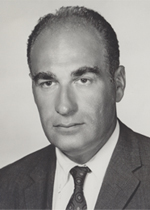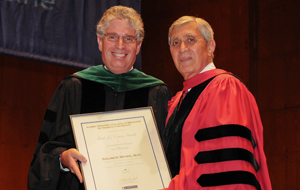

Honoring a Visionary
New Faculty Award at Commencement Honors Memory of Dr. Saul R. Korey
At commencement on Wednesday, May 30, 2012, the College of Medicine presented a new faculty award — the inaugural Saul R. Korey Award for Translational Medicine and Science — to Dr. Solomon Moshé. The award was established to honor the memory of Einstein's founding chair of neurology who in spite of his early death at the age of 45 in 1963, is a continuing influence at the medical school and beyond with regard to neurology, neuroscience and translational medicine. With its inception this year and going forward, the award will recognize a faculty member who exemplifies Dr. Korey's philosophy of conducting collaborative research in the laboratory that addresses questions raised through clinical work with patients.

Saul Korey, M.D., Einstein's founding chair of neurologyDr. Moshé's selection for the award is certainly fitting. A member of the Einstein faculty since 1979, his research has focused on understanding the mechanisms underlying age- and sex-related differences in epilepsy in humans and in animal models. As a physician-scientist, Dr. Moshé has served as an influential mentor to promising young clinicians and scientists within Einstein, Montefiore Medical Center, Jacobi Medical Center and beyond. During the past three decades, he mentored numerous trainees worldwide in basic science, epilepsy-related research, child neurology and clinical neurophysiology. In addition to serving as professor in neurology, pediatrics and neuroscience, he is vice chair of neurology and director of child neurology and of clinical neurophysiology at Einstein and Montefiore. He also currently serves as president of the International League against Epilepsy and has held numerous other leadership positions within the field.
Of his selection as award recipient Dr. Moshé reflected, "I'm deeply honored to receive this award named for our department founder and first chair. Saul Korey, was a consummate physician whose vision was ahead of its time. He implemented translational research as the core of an academic neurology department 55 years before the term became fashionable."
He added, "I feel as if I'm finally meeting him to receive the passing of the baton to keep that vision alive. And I'd like to thank him for showing us how, through research, teaching and compassion we can improve the lives of people with neurological diseases."

Solomon Moshé receiving the Saul R. Korey Award for Translational Medicine and ScienceSaul Korey was recruited to Einstein in 1955 by Dr. Irving London, Einstein's founding chair of medicine. The two men had become friends during the late 1940s when both were completing residencies at what was then Columbia-Presbyterian Medical Center. The two men shared the conviction that basic medical science was critically important to the advancement of clinical medicine. Together, they were instrumental in convincing Einstein's first dean, Dr. Marcus Kogel, that the College of Medicine should be a research medical school as well as an institution that trains future practitioners.
"Dr. Korey established the first neurobiologic neurology department in the nation," recalled Dr. Isabelle Rapin, professor in the Saul R. Korey Department of Neurology and of pediatrics. "He had extraordinarily creative vision and believed that, without sacrifice of humane and high-quality clinical care, neurologists and scientists should attempt to answer questions in the laboratory posed by patients in the clinical setting. He was a tremendous role model for all of us."
In introducing the new award, Dr. Allen M. Spiegel, Einstein's Marilyn and Stanley M. Katz Dean, noted, "The award honors the memory of Einstein's founding chair of neurology whose vision for the department still offers inspiration today, more than 48 years since his passing."
A highlight of the presentation was the presence of Dr. Korey's widow, Doris B. Korey. "The ceremony was beautiful, with such a broad variety of students," she said. "I know Saul would be very proud. He loved Einstein so."
In further recognition of Dr. Korey, a number of scientific luminaries from Einstein and elsewhere have shared their memories of his leadership and influence in the field of neurology, as well as the practice of compassionate medicine. Their reflections can be viewed by clicking on the links at each name, below.
If you have memories about Dr. Korey you'd like to share, too, please click on "Comment" below to add your own entry. Or share your thoughts on how Dr. Korey's vision has influenced your work or your perspective on the synergy between science and medicine.
Posted on: Wednesday, June 6, 2012

Tablet Blog